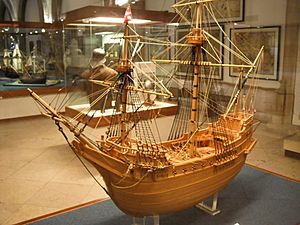Madre de Deus facts for kids

Model of the Portuguese carrack Madre de Deus, in the Maritime Museum (Lisbon)
|
|
Quick facts for kids History |
|
|---|---|
| Name | Madre de Deus, Mãe de Deus and Madre de Dios |
| Builder | Lisbon shipyards, Kingdom of Portugal |
| In service | 1589 |
| Out of service | 1592 |
| Fate | Captured by the English |
| General characteristics | |
| Class and type | Carrack |
| Displacement | 1600 tons |
| Tons burthen | 900 tons |
| Length | 100 ft (30.48 m) keel, 165 ft (50.29 m) (beakhead to stern) |
| Beam | 14.27 metres (46 ft 10 in) |
| Draught | 31 ft (9.45 m) |
| Sail plan | Full-rigged, main mast is 121 ft (36.88 m) high |
| Complement | 600–700 men |
| Armament | At least 32 guns |
Madre de Deus (meaning Mother of God) was a huge Portuguese sailing ship called a carrack. She was famous for being able to carry a lot of cargo and supplies for very long trips across the ocean. In 1592, while returning from her second journey to the East, she was captured by the English during a battle near the Azores islands. This capture made England very interested in trading with the Far East, which had been a special right (monopoly) of Portugal.
Contents
About This Giant Ship
The Madre de Deus was built in Lisbon, Portugal, in 1589. She was about 50 meters (165 feet) long and 14 meters (47 feet) wide. This massive ship weighed 1,600 tons and could carry 900 tons of goods.
Ship Features and Crew
The Madre de Deus had seven decks, like floors in a building. She was armed with 32 guns and other weapons. A large crew of 600 to 700 sailors worked on board. The ship also had beautiful golden decorations and a huge storage area filled with valuable items.
The Capture of the Madre de Deus
In 1592, Portugal and Spain were united under one ruler. This meant that an old peace treaty between England and Portugal was not active. Since England and Spain were at war, Portuguese ships became targets for the English navy.
The Battle at Flores Island
On August 3, 1592, a group of six English warships sailed to the Azores islands. Their mission was to stop Spanish ships coming from the New World. Near Corvo Island, a Portuguese fleet appeared. The English ship Roebuck, led by John Burgh, chased the Madre de Deus. After a fierce, day-long battle near Flores Island, the English finally captured the giant Portuguese carrack.
The Amazing Treasure Found
The Madre de Deus was filled with incredible riches. The English found chests overflowing with jewels and pearls. There were also gold and silver coins, and a valuable substance called ambergris used in perfumes.
The ship carried rolls of the finest cloth and beautiful tapestries. It also held a massive amount of spices: 425 tons of pepper, 45 tons of cloves, 35 tons of cinnamon, and 3 tons each of mace and nutmeg. Other valuable cargo included 2.5 tons of benzoin (a sweet-smelling resin for perfumes and medicines), 25 tons of cochineal (a red dye), and 15 tons of ebony wood.
A Secret Document
Among the treasures was a very important document. It was printed in Macau in 1590 and contained valuable information about trade with China and Japan. This document was carefully wrapped in many layers of fine cloth and placed in a cedar wood box, as if it were a priceless jewel.
What Happened Next
After its capture, the Madre de Deus was anchored in Dartmouth. Many curious local people came to see the ship. Unfortunately, this also attracted traders, dealers, and thieves from all around.
The Missing Treasure
By the time Walter Raleigh arrived and brought order, much of the treasure had been stolen. The cargo was first thought to be worth about half a million British pounds. This was almost half of England's entire treasury at the time! However, after the thefts, its value was reduced to £140,000.
See also
- The Armada Service
- List of longest wooden ships
- Santa Catarina (ship), her capture by the Dutch increased VOC capital by more than 50%
- Santa Anna (1522 ship)
- São João Baptista (galleon)
- Djong (ship)
- Baochuan
 | Ernest Everett Just |
 | Mary Jackson |
 | Emmett Chappelle |
 | Marie Maynard Daly |

